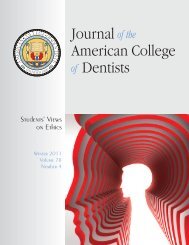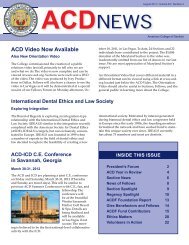JACD 71-4 - American College of Dentists
JACD 71-4 - American College of Dentists
JACD 71-4 - American College of Dentists
- No tags were found...
Create successful ePaper yourself
Turn your PDF publications into a flip-book with our unique Google optimized e-Paper software.
<strong>of</strong>fices are now <strong>of</strong>fering the ultimate<br />
cosmetic makeover service <strong>of</strong> permanent<br />
makeup tattooing. There are even dentists<br />
who <strong>of</strong>fer botox injections, justified as<br />
dental treatment, because, and here<br />
I am quoting from the advertisement,<br />
“They reduce the muscle tension that<br />
contributes to oral pain and damage with<br />
the main side effect that you can lose<br />
some <strong>of</strong> your wrinkles and refresh<br />
your aging smile.” Now isn’t that clever<br />
commercial marketing?<br />
And, I can hear you thinking again,<br />
“So what? Who cares if whiter, brighter<br />
teeth is dentistry’s ubiquitous public<br />
message today? At least it brings patients<br />
into our <strong>of</strong>fices. How is this message<br />
demeaning to the pr<strong>of</strong>ession <strong>of</strong> dentistry?”<br />
Because it is a solely commercial<br />
message. It is not a health care service<br />
message. It is a cosmetic business service<br />
message. And again you answer: “So<br />
what? So is plastic surgery.” Well, tooth<br />
whitening isn’t surgical unless it involves<br />
veneers. When it is tooth bleaching and<br />
the spa experience, it is directly analogous<br />
to hair bleaching and cosmetics. It<br />
is not surgery; it is cosmetology—plain<br />
and simple.<br />
Parenthetically, we are not even<br />
sure <strong>of</strong> the long-term effects that tooth<br />
whitening might have on the oral health<br />
<strong>of</strong> our cosmetology clients. Do we know<br />
what effect the bleach and heat used to<br />
whiten teeth will have on pulpal tissues?<br />
No. But many <strong>of</strong> us seem only too eager<br />
to <strong>of</strong>fer tooth bleaching as a commercial<br />
dental service.<br />
And what <strong>of</strong> the public’s attitude<br />
toward dentists? How do they see a pr<strong>of</strong>ession<br />
that <strong>of</strong>fers them cosmetology as<br />
its most visible public service? Does the<br />
general public embrace the notion that<br />
oral health is part <strong>of</strong> their overall health,<br />
and that you cannot be healthy without<br />
a healthy mouth? Sadly, I think not.<br />
Ever since the pr<strong>of</strong>ession <strong>of</strong> dentistry<br />
stood by while dental care for seniors<br />
was omitted from Medicare, we have<br />
Journal <strong>of</strong> the <strong>American</strong> <strong>College</strong> <strong>of</strong> <strong>Dentists</strong><br />
Today the loudest<br />
message being<br />
received by North<br />
<strong>American</strong> society is<br />
that dentistry is an<br />
elective cosmetics<br />
service which can<br />
help you look younger<br />
and sexier.<br />
fought an uphill battle to convince<br />
government, health insurers, and the<br />
public that oral health is an essential<br />
component <strong>of</strong> overall systemic health.<br />
I think that we have been making<br />
significant progress in this uphill battle,<br />
most notably with the Surgeon General’s<br />
Report on Oral Health and the resultant<br />
National Oral Health Plan. But today the<br />
loudest message being received by North<br />
<strong>American</strong> society is that dentistry is an<br />
elective cosmetics service which can<br />
help you look younger and sexier.<br />
There is no message about oral health<br />
as a vital component <strong>of</strong> overall health<br />
in the “bright smile and white teeth”<br />
advertising campaign.<br />
And again you are asking yourself,<br />
“So what? This is the platinum age <strong>of</strong><br />
dentistry. <strong>Dentists</strong>’ incomes have never<br />
been higher. Things have never been so<br />
good for the dental pr<strong>of</strong>ession! Why is<br />
Graham complaining about cosmetic<br />
dentistry? So what if the public sees us<br />
as cosmetologists?”<br />
Let me try to explain what is bothering<br />
me. Put simply, our existence as a<br />
pr<strong>of</strong>ession <strong>of</strong> dentistry is dependent, in<br />
the final analysis, on what the public<br />
thinks <strong>of</strong> us. The public—that is, society—<br />
affords us the privilege <strong>of</strong> being a<br />
pr<strong>of</strong>ession on the basis <strong>of</strong> its trust that<br />
dentists put the oral health care needs<br />
2004 ACD Annual Meeting<br />
<strong>of</strong> our patients ahead <strong>of</strong> our own desires<br />
to make money. Because <strong>of</strong> society’s<br />
trust in us, we have the privilege <strong>of</strong><br />
educating dentists, licensing dentists,<br />
and disciplining dentists, all with virtually<br />
no societal—that is, no governmental—<br />
oversight. We are, perhaps, the last real<br />
true pr<strong>of</strong>ession in North America.<br />
But I believe that this privileged<br />
status is in dire jeopardy. I believe that<br />
we are in danger <strong>of</strong> convincing society<br />
that we no longer deserve pr<strong>of</strong>essional<br />
status, because we have crossed over the<br />
line between oral health pr<strong>of</strong>essional<br />
and dental businessperson, crossed<br />
over that line to become full-fledged<br />
businessmen and women, as dental<br />
cosmetologists.<br />
As an example <strong>of</strong> the way the<br />
commercialization <strong>of</strong> dentistry could<br />
cause its “de-pr<strong>of</strong>essionalization,” we<br />
need only reflect on the precipitous fall<br />
<strong>of</strong> the pharmacist from pr<strong>of</strong>essional<br />
status. Until the 1960s, the pharmacist<br />
was our society’s respected corner<br />
druggist, trusted to give the public sage<br />
advice about prescription and over-thecounter<br />
medicines. Then, with the<br />
corporatization <strong>of</strong> the corner drug store<br />
into chain mega-stores filled with more<br />
groceries and household goods than<br />
medications, the pharmacist/druggist<br />
was downgraded in society’s regard to a<br />
slightly gentrified convenience store<br />
owner. It is only during the past decade,<br />
with the dual strategies <strong>of</strong> the pharmacy<br />
doctorate degree and the strong<br />
marketing by the drugstore chains <strong>of</strong><br />
the pharmacist as a newly minted<br />
“medication counselor” that we have<br />
begun to see even a modicum <strong>of</strong> pr<strong>of</strong>essional<br />
status returning to the pharmacist.<br />
Could this happen to dentistry?<br />
Could we miss our chance to apply<br />
molecular medicine, tissue engineering,<br />
and computer-assisted decision making<br />
to the care <strong>of</strong> our future patients, sinking,<br />
9





